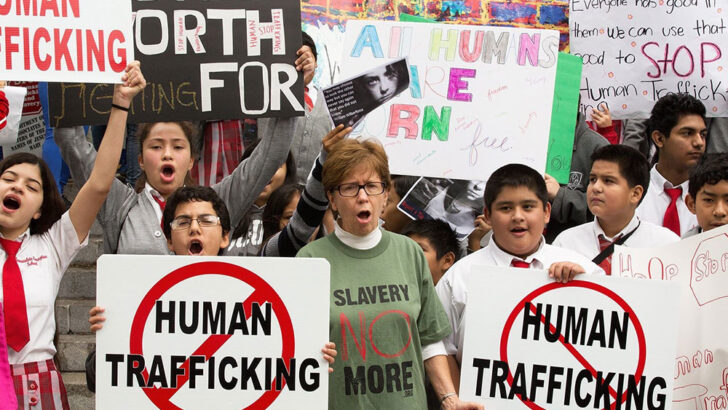Human trafficking: a crime against humanity
Dear Editor, I was deeply moved by the recent article discussing the escalating issue of human trafficking and the call for increased parish involvement in combating this grave injustice. Cardinal Vincent Nichols’ stark observation that “things are getting worse” underlines the urgent need for action within our communities [The Irish Catholic – July 4, 2024].
The Senior Leadership Summit on combatting human trafficking, held at UCC in Cork, highlighted the critical role that each of us, particularly our parishes, must play in addressing this heinous crime. The presence of high-ranking officials from the USA, UK and Ireland, along with influential religious leaders and advocates, underscores the global and local dimensions of this issue.
It is alarming to hear that victims of trafficking are “hidden in plain sight,” as Minister for Justice Helen McEntee noted. This reality demands that our parishes become more vigilant and proactive. Human trafficking is not just an issue of forced prostitution but extends to various forms of exploitation, including agriculture, domestic service, and other industries, as Sr Liz Murphy aptly pointed out.
Our parishes must become sanctuaries of awareness and action. By educating ourselves about the signs of trafficking and the resources available for victims, we can become powerful advocates for those who are often voiceless. Practical steps, such as attending training sessions on identifying trafficking indicators, distributing informative materials and establishing support networks, are essential.
Moreover, we must embody the Christian call to uphold human dignity in every aspect of our parish life. This includes being the “eyes and ears—and the voice” for the vulnerable in our communities, as the bishops urged. Prayer, while powerful, must be coupled with concrete actions. Reporting suspicious activities, supporting local anti-trafficking initiatives and providing aid to survivors are ways we can translate our faith into impactful deeds.
Human trafficking is indeed a crime against humanity, and it is a moral imperative for us, as Catholics, to respond with compassion and determination. Let us heed the bishops’ call to action and work collectively to end this modern-day slavery.
Yours etc.,
Sarah Doherty
Dundrum, Dublin 16
Pilgrimages as fulfilling spiritual transformations
Dear Editor, I found your article on the rising popularity of the Camino de Santiago pilgrimage, as reported by National Geographic, to be very interesting [The Irish Catholic – July 4, 2024]. It is fascinating to see how these ancient spiritual paths are being utilised by people for various reasons, particularly fitness and health.
However, I believe it is essential to emphasise that many individuals discover and deepen their faith while on pilgrimage. The spiritual healing that these journeys offer is profound and transformative. Pilgrimages have long been a means for believers to seek physical healing, as well as spiritual renewal, through the intercession of saints and the grace of God.
Dr Louise Nugent’s insights into the historical motivations for pilgrimages, such as belief in the power of saints, atonement for sins, and indulgences, highlight the deep spiritual roots of these journeys. Even today, countless pilgrims embark on these paths with the hope of experiencing spiritual growth and healing. While some may start their journey for fitness or adventure, many find that the act of walking these sacred paths opens their hearts to deeper spiritual experiences.
The Camino de Santiago, in particular, has a long tradition of leading people to profound personal and spiritual revelations. The physical challenges of the pilgrimage often mirror the inner journey of the soul, allowing pilgrims to confront and reflect on their lives in meaningful ways. As Kimberly Davis mentioned, the pilgrimage provides a “bubble of peace”, which can be a fertile ground for spiritual awakening.
Moreover, the communal aspect of pilgrimage, where individuals from diverse backgrounds walk together, often fosters a sense of shared humanity and divine presence. This can lead to unexpected encounters with faith, as people support and connect with one another along the way.
While the contemporary trend of using pilgrimages for fitness is indeed interesting, it is crucial to recognise the enduring spiritual significance of these journeys. Pilgrimages can be a powerful means of encountering God, finding inner peace and experiencing profound healing. Encouraging people to explore these paths with an open heart can lead to unexpected and deeply fulfilling spiritual transformations.
Yours etc.,
Phil Moynihan
Blanchardstown, Dublin
Synodality and future decisions…
Dear Editor, The Irish Bishops have delivered to Rome their excellent report on the Irish synodality programme. This will be an important document for the Synod to be held in October at Rome.
Fr Gerry O’Hanlon [The Irish Catholic– July 4, 2024] has pointed out that “Synodality will not survive without decisions”. Referring to the involvement of the laity in the Church he points out that “co-responsibility is only going to be possible when the unique authority given to the parish priest in Canon Law is balanced with a definition of the authority of the laity”.
To date, synodality has been a process of Catholics speaking freely and listening with respect to each other and who are now looking forward to hearing what decisions will be made for the future.
Yours etc.,
Daithi O’Muirneachain
Drumcondra, Dublin 9


 People are pictured displaying signs in Los Angeles during the ‘Walk 4 Freedom’ in advance of National
Human Trafficking Awareness Day. Photo: OSV News
People are pictured displaying signs in Los Angeles during the ‘Walk 4 Freedom’ in advance of National
Human Trafficking Awareness Day. Photo: OSV News 